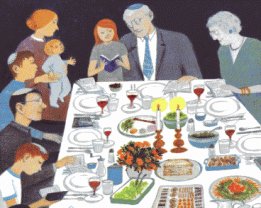|
An elderly man in Miami calls his son in New York and says, "I hate to ruin your day, but I have to tell you that your mother and I are divorcing. Forty-five years of misery is enough." "Pop, what are you talking about?" the son screams.
"We can't stand the sight of each other any longer," the old man says. "We're sick of each other, and I'm sick of talking about this, so you call your sister in Chicago and tell her," and he hangs up.
Frantic, the son calls his sister, who explodes on the phone, "Like heck they're getting divorced," she shouts, "I'll take care of this." She calls her father immediately and screams at the old man, "You are NOT getting divorced! Don't do a single thing until I get there. I'm calling my brother back! , and we'll both be there tomorrow. Until then, don't do a thing, DO YOU HEAR ME?" and hangs up.
The old man hangs up his phone and turns to his wife. "Honey,” he says, "They're coming for Passover and paying their own airfares."
***
Passover is, by its very definition, a national holiday. Commemorating our birth as a people, Passover celebrates the creation of a new and free nation destined to transform civilization. Following its Exodus from Egypt, the youthful nation could forge its own destiny, crate its own vision, build its own homeland, and make its unique impact on mankind – all the endeavors the Jewish people engaged in following their liberation from Egyptian tyranny on Passover.
One would thus expect that the holiday rituals would emphasize the "nation" motif, the idea of our collective and national identity. Perhaps, we would imagine, the Torah would instruct us to assemble on Passover the entire nation (as it instructs at the end of Deuteronomy to gather the whole nation once in seven years, during the Sukkot holiday), or suggest another ritual that would reflect the national dimensions of Jewish life.
Yet, surprisingly, the Torah does exactly the reverse. The way Passover is to be celebrated, the Hebrew Bible informs us, is through individualized seder meals, conducted in the privacy of homes. “Every man must take a lamb for the family, a lamb for each household. If the household is too small for a lamb, then he and a close neighbor can obtain a lamb together, as long as it is for specifically designated individuals. Individuals shall be designated for a lamb according to how much each one will eat (1).”
And then even more: “It must be eaten in one house; do not bring any of its meat out of the house (2).”
In other words, each home had to have its own lamb and its own Passover seder meal; each Jew was individually designated to one particular seder; every person had to be confined to his or her particular home or company for the duration of the Passover repast.
Even today, in the absence of the Jerusalem Temple, when the Passover lamb is not part of the seder, the emphasis of Passover remains on the individual home and family. “You must relate the story to your child,” Moses instructs the people (3). The entire Seder structure was created in order to engage the children seated around the table (4).
Also the prohibition against eating leaven (chamatz) and the instruction to eat matzah during Passover express themselves primarily in the confinements of the home.
So we ask the question, why the absolute and radical emphasis on the individual home during our national holiday?
The Nucleus of Civilization
The answer to this question captures Judaism’s perspective on the path of a people to redemption and renewal. More than three millennia ago, the Torah was teaching us, that the battle for society began at the home. The family – not the synagogue, not the university, not the market place, not the battlefield -- was the nucleus of civilization.
The Torah understood that it is in the home – in the loving, nonjudgmental, and warm embrace of the home, “the spot where expressions of tenderness gush out without any sensation of awkwardness and without any dread of ridicule" (as a wise man once remarked) – where the future of humanity is created.
We are well aware today of how much of the psychological, emotional and spiritual turmoil in our lives can be traced back to dysfunctional homes. “If you don't believe in ghosts, you've never been to a family reunion,” Ashleigh Brilliant once remarked. Our problems, at least many of them, arise out of the homes in which we develop our primal identities and relationships. So the Torah is telling us, that if there is to be reformation, if there is to be a change, if there is to be redemption, it must begin in the home. It is here that truth is learned, that integrity is cultivated, that self-discipline is instilled, that love is nurtured and that a vision for a liberated future is ingrained.
Judaism understood that what matters most, occurred not in boardrooms, but in kitchens; not by CEO’s but by mothers and fathers cuddling their children and sharing with them the story of the human potential to liberate itself from the confinements of instinct, selfishness, hate and superficiality.
On Passover the Torah tells us: You want to become a nation and change the world? Go home (5)!
Footnotes:
1) Exodes 12:3-4. Cf. Talmud Pesachim 81a.
2) Exodus 12:46.
3) Exodus 13:8.
4) See Talmud tenth chapter of Pesachim.
5) This article is based on a Passover letter written by the Lubavitcher Rebbe, 11 Nissan 5724, April 1964. This was the time when the once un-breakable family bond began to erode in the United States, crating a vacuum that transformed the future of our society.
|
